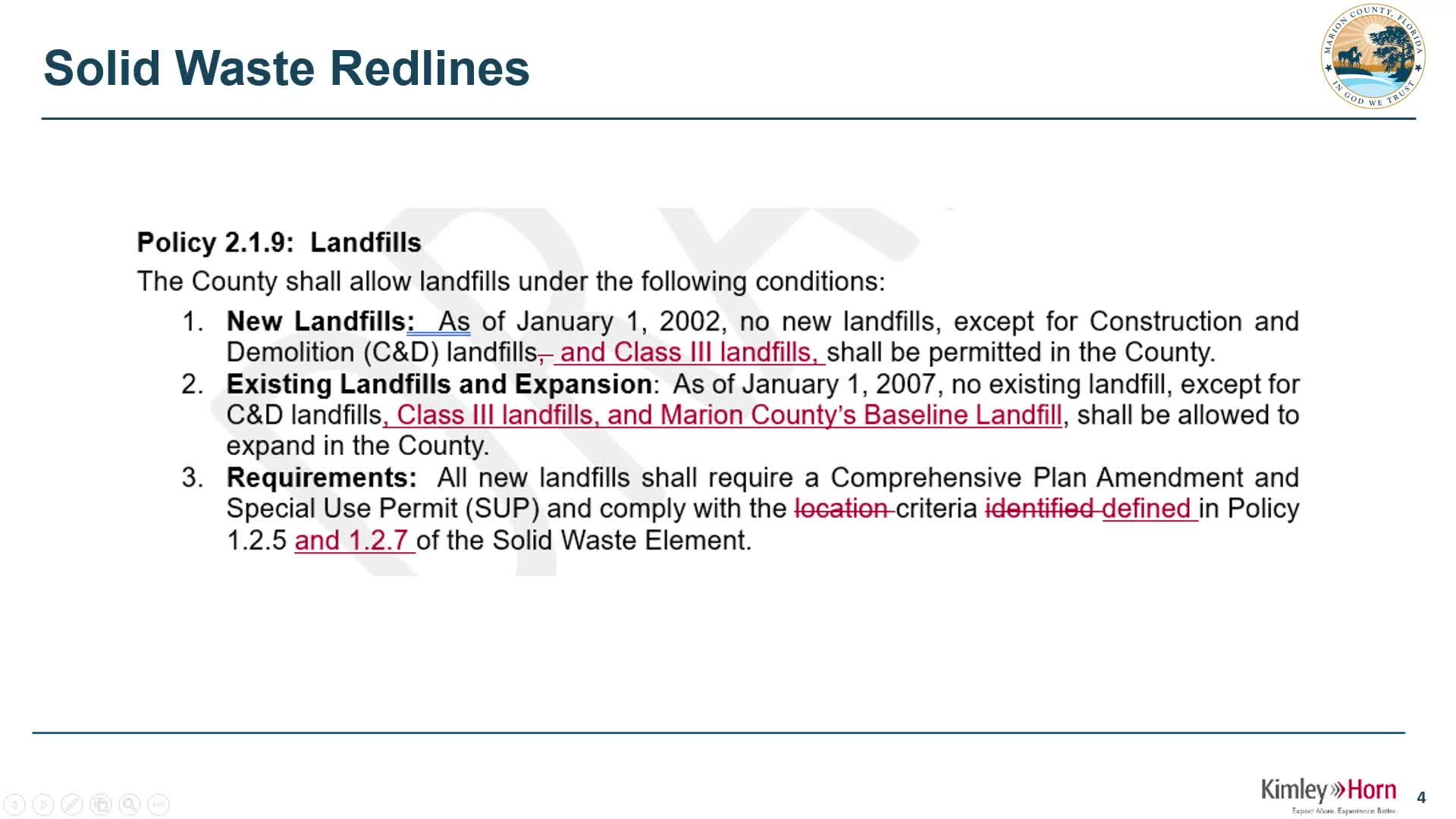Marion County commissioners discuss limiting new landfill applications to west of I‑75, keep rules in comprehensive plan
Get AI-powered insights, summaries, and transcripts
Subscribe
Summary
County staff and commissioners debated adding geography-based limits for new landfill siting in the comprehensive plan, with staff recommending West of I‑75 as the preferred area for new facilities while preserving discretionary review for any application.
Marion County commissioners and staff debated whether the county’s comprehensive plan should restrict new solid waste landfills to the west side of Interstate 75 and clarify the approval requirements for new private facilities.
The discussion centered on a proposed change to the comprehensive plan’s solid waste policies that would allow new Class 3, C and D disposal facilities only on land west of I‑75. Blair Knighton, a planning staff member leading the workshop, presented draft policy language and said staff had revised an earlier, more detailed list of required demonstrations for new facilities to make it practical and implementable.
The change was prompted in part by comments from Mark (last name not specified), identified in the meeting as the county’s solid waste director, who told the commission the county currently has multiple disposal sites east of I‑75 and “we are lacking disposal capacity West Of the freeway.” Mark urged a geography-based approach rather than a purely categorical policy, telling commissioners the county should encourage siting where capacity is scarce.
Why it matters: commissioners said a clear policy would give staff and potential applicants guidance about where the county is willing to accept applications and would help protect prior county investments in existing facilities. Commissioner Curry asked whether the comprehensive plan is the appropriate place for location controls; Blair Knighton and other staff advised that because new landfills would require a comprehensive plan amendment, siting criteria in the plan would be enforceable and would give staff clarity on where applications could be accepted.
Commissioners discussed details and limits of the proposed language. Tracy Straub, who said the West‑of‑I‑75 preference was also included in the county’s Empowering Marion strategic plan, supported adding the West‑side language to the comprehensive plan for new landfills. Commissioner Stone and others cautioned against creating a legal “foothold” that could leave the county vulnerable if it accepted applications in a restricted area and then denied them; county counsel (referred to as Guy) commented that the comprehensive plan sets fundamental policy and the commission should not promise to accept applications in locations where it does not intend to authorize development.
Staff described required demonstrations an applicant would need to provide for a new private facility — including effects on public health, safety and welfare, the financial impact on the county solid waste system, and past performance of waste handling operations — and said those requirements had been trimmed from a longer, “onerous” list to a shorter, practical set that staff and Mark supported.
Commissioners also considered operational questions: whether waivers or extraordinary‑circumstance exceptions should be allowed if an applicant proposed a new facility outside the West‑of‑I‑75 area, and how to avoid unintentionally creating a magnet for development on the West side. Some commissioners preferred leaving siting language out of the plan and relying on case‑by‑case review in the land development code; others favored placing a geographic preference in the comprehensive plan to safeguard existing county investments.
Outcome/next steps: The commission reached a practical consensus to leave the landfill policy language as currently drafted with the West‑of‑I‑75 preference for new facilities and to not reopen the issue at this meeting. Staff will not bring the landfill language back for immediate revision, per the comment at the end of the workshop that the board had “agreed” and the item would not be returned for further change at this time.
